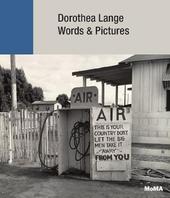
|
Dorothea Lange: Words + Pictures
Hardback
Main Details
Description
Towards the end of her life, Dorothea Lange (American, 1895-1965) remarked that "all photographs-not only those that are so-called 'documentary,' and every photograph really is documentary and belongs in some place, has a place in history-can be fortified by words." Though Lange's career is widely heralded, this connection between words and pictures has received scant attention. Published in conjunction with an exhibition at The Museum of Modern Art, this catalogue provides a fresh approach to some of her best-known and beloved photographs, highlighting the ways in which these images first circulated in magazines, government reports, books, etc. An introductory text by curator Sarah Hermanson Meister will be followed by plates organized according to "words" from a variety of sources that expand our understanding of the photographs. The featured photographs will range from Lange's first engagement with documentary photography in San Francisco in the early-mid 1930s, including her iconic White Angel Breadline (1933), to landmark photographs she made for the Resettlement Administration (later the Farm Security Administration) such as Migrant Mother (1936), powerful photographs made during World War II in California's internment camps for Japanese-Americans, major photo-essays published in Life magazine on Mormon communities in Utah (in 1954) and County Clare, Ireland (in 1955), and quietly damning photographs made in the Berryessa Valley in 1956-57, before the region was flooded by the construction of a dam intended to address California's chronic water shortages. Exhibition opens December 2019.
Author Biography
Sarah Hermanson Meister is a Curator in the Department of Photography at the Museum of Modern Art, New York.
ReviewsAfter documenting nearly a half-century of crises and the lives of those most deeply affected by them, Lange understood, possibly too well, the enormous responsibility that comes with telling any story, but especially the story of other people's struggles. Fear is an embodied knowledge, an almost physical intuition of possible outcomes learned through past experience. It can spin into paranoia, paralyze us, shock us into impassivity. But it can also be a powerful drive, as I suppose it was for Lange, who with all her "darkroom terrors" was still able to document what many others had not yet seen or wanted to see.--Valeria Luiselli "New York Review of Books" Bad as it is, the world is potentially full of good photographs. Dorthea Lange once said. But to be good the photographs have to be full of the world. Lange's images...invariably were.-- "Elle" A complex portrait of American life at its most bleak.--Sara Rosen "Feature Shoot" Lange was a poet of the ordinary but imperious human need, under any conditions, for mutual contact.--Peter Schjeldahl "New Yorker" Underscores the tremendous power that images sustain over time.--Caroline Goldstein "Artnet" Finding Sympathy And Solidarity In Dorothea Lange.--Colin Dwyer "NPR" In considering the words that provide the politicized context for Lange's work, Meister focuses primarily on what some have called the "afterlife of photographs"--that is, not the decisive moment of capture, but rather the subsequent uses of images, how they circulate and accrue new meanings, often well beyond the photographer's original intentions.--Brian Wallis "Aperture" In Lange's photography, human ingenuity and grace triumph over the unspeakable blows of the Great Depression and other social oppression, even when hope is in short supply.--Ela Bittencourt "Hyperallergic" Dorothea Lange's boldly political photography defined the iconography of WPA and Depression-era America.--Charles Caesar "Galerie" In this publication, the work of groundbreaking photographer Dorothea Lange work is presented in diverse contexts, ranging from photobooks, Depression-era government reports, newspapers, magazines, and poems, alongside writings by contemporary artists, writers and thinkers.--Eileen Kinsella "Artnet" [Dorothea Lange: Words & Pictures] examines the way words -- including Lange's own, which Lange often presented in extended captions, and the words in Lange's photographs -- have guided our understanding of [her] work.--Tyler Green "Modern Art Notes Podcast" [Dorothea Lange's] best-known images are of indelible faces in hardscrabble places...--Andrea K Scott "New Yorker" [Lange's] legacy combines two fields -- art and journalism -- whose entirely separate constraints and ethics can still, at their best, change the world.--Alice Gregory "New York Times" [Lang] saw clearly and concisely, without sentiment or polemics, but her pictures never feel detached or merely repertorial.--Vince Aletti "Photograph" A bracing tribute to an astonishing artist, a woman who survived childhood polio (though not unscathed) and hauled herself and her camera across the US in its most crushing years. [...] She understood how to tune her vision to human beauty.--Ariella Budick "Financial Times" A profoundly sensitive portrait photographer and one of the most influential documentarians of the early and mid-20th century.--Alexxa Gotthardt "Artsy" One happy consequence of our dismal political moment is a rediscovery of Lange.--Arthur Lubow "New York Times" While Lange's images have always spoken to us, her subjects weren't always able to speak for themselves. Words were perhaps important to Lange because they weren't always implicit; rather, they were hard-earned.--Jadie Stillwell "Interview" With or without the support of words, Dorothea Lange (1895-1965), created some of the greatest images of the unsung struggles and overlooked realities of American life.--Arthur Lubow "New York Times"
|